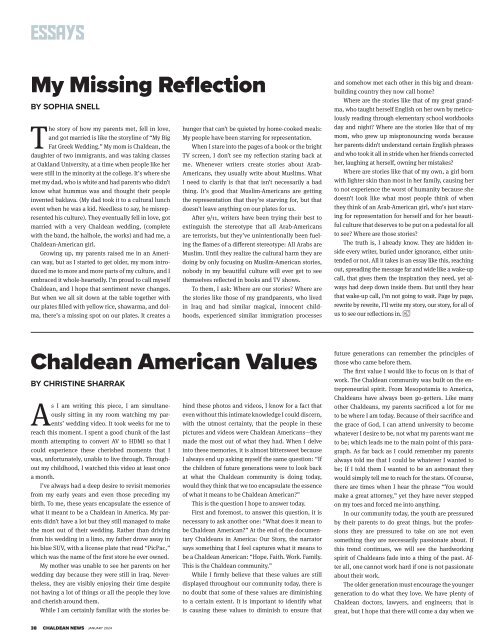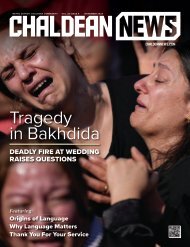Create successful ePaper yourself
Turn your PDF publications into a flip-book with our unique Google optimized e-Paper software.
ESSAYS<br />
My Missing Reflection<br />
BY SOPHIA SNELL<br />
The story of how my parents met, fell in love,<br />
and got married is like the storyline of “My Big<br />
Fat Greek Wedding.” My mom is Chaldean, the<br />
daughter of two immigrants, and was taking classes<br />
at Oakland University, at a time when people like her<br />
were still in the minority at the college. It’s where she<br />
met my dad, who is white and had parents who didn’t<br />
know what hummus was and thought their people<br />
invented baklava. (My dad took it to a cultural lunch<br />
event when he was a kid. Needless to say, he misrepresented<br />
his culture). They eventually fell in love, got<br />
married with a very Chaldean wedding, (complete<br />
with the band, the halhole, the works) and had me, a<br />
Chaldean-American girl.<br />
Growing up, my parents raised me in an American<br />
way, but as I started to get older, my mom introduced<br />
me to more and more parts of my culture, and I<br />
embraced it whole-heartedly. I’m proud to call myself<br />
Chaldean, and I hope that sentiment never changes.<br />
But when we all sit down at the table together with<br />
our plates filled with yellow rice, shawarma, and dolma,<br />
there’s a missing spot on our plates. It creates a<br />
hunger that can’t be quieted by home-cooked meals:<br />
My people have been starving for representation.<br />
When I stare into the pages of a book or the bright<br />
TV screen, I don’t see my reflection staring back at<br />
me. Whenever writers create stories about Arab-<br />
Americans, they usually write about Muslims. What<br />
I need to clarify is that that isn’t necessarily a bad<br />
thing. It’s good that Muslim-Americans are getting<br />
the representation that they’re starving for, but that<br />
doesn’t leave anything on our plates for us.<br />
After 9/11, writers have been trying their best to<br />
extinguish the stereotype that all Arab-Americans<br />
are terrorists, but they’ve unintentionally been fueling<br />
the flames of a different stereotype: All Arabs are<br />
Muslim. Until they realize the cultural harm they are<br />
doing by only focusing on Muslim-American stories,<br />
nobody in my beautiful culture will ever get to see<br />
themselves reflected in books and TV shows.<br />
To them, I ask: Where are our stories? Where are<br />
the stories like those of my grandparents, who lived<br />
in Iraq and had similar magical, innocent childhoods,<br />
experienced similar immigration processes<br />
and somehow met each other in this big and dreambuilding<br />
country they now call home?<br />
Where are the stories like that of my great grandma,<br />
who taught herself English on her own by meticulously<br />
reading through elementary school workbooks<br />
day and night? Where are the stories like that of my<br />
mom, who grew up mispronouncing words because<br />
her parents didn’t understand certain English phrases<br />
and who took it all in stride when her friends corrected<br />
her, laughing at herself, owning her mistakes?<br />
Where are stories like that of my own, a girl born<br />
with lighter skin than most in her family, causing her<br />
to not experience the worst of humanity because she<br />
doesn’t look like what most people think of when<br />
they think of an Arab-American girl, who’s just starving<br />
for representation for herself and for her beautiful<br />
culture that deserves to be put on a pedestal for all<br />
to see? Where are those stories?<br />
The truth is, I already know. They are hidden inside<br />
every writer, buried under ignorance, either unintended<br />
or not. All it takes is an essay like this, reaching<br />
out, spreading the message far and wide like a wake-up<br />
call, that gives them the inspiration they need, yet always<br />
had deep down inside them. But until they hear<br />
that wake-up call, I’m not going to wait. Page by page,<br />
rewrite by rewrite, I’ll write my story, our story, for all of<br />
us to see our reflections in.<br />
Chaldean American Values<br />
BY CHRISTINE SHARRAK<br />
As I am writing this piece, I am simultaneously<br />
sitting in my room watching my parents’<br />
wedding video. It took weeks for me to<br />
reach this moment. I spent a good chunk of the last<br />
month attempting to convert AV to HDMI so that I<br />
could experience these cherished moments that I<br />
was, unfortunately, unable to live through. Throughout<br />
my childhood, I watched this video at least once<br />
a month.<br />
I’ve always had a deep desire to revisit memories<br />
from my early years and even those preceding my<br />
birth. To me, these years encapsulate the essence of<br />
what it meant to be a Chaldean in America. My parents<br />
didn’t have a lot but they still managed to make<br />
the most out of their wedding. Rather than driving<br />
from his wedding in a limo, my father drove away in<br />
his blue SUV, with a license plate that read “PicPac,”<br />
which was the name of the first store he ever owned.<br />
My mother was unable to see her parents on her<br />
wedding day because they were still in Iraq. Nevertheless,<br />
they are visibly enjoying their time despite<br />
not having a lot of things or all the people they love<br />
and cherish around them.<br />
While I am certainly familiar with the stories behind<br />
these photos and videos, I know for a fact that<br />
even without this intimate knowledge I could discern,<br />
with the utmost certainty, that the people in these<br />
pictures and videos were Chaldean Americans—they<br />
made the most out of what they had. When I delve<br />
into these memories, it is almost bittersweet because<br />
I always end up asking myself the same question: “If<br />
the children of future generations were to look back<br />
at what the Chaldean community is doing today,<br />
would they think that we too encapsulate the essence<br />
of what it means to be Chaldean American?”<br />
This is the question I hope to answer today.<br />
First and foremost, to answer this question, it is<br />
necessary to ask another one: “What does it mean to<br />
be Chaldean American?” At the end of the documentary<br />
Chaldeans in America: Our Story, the narrator<br />
says something that I feel captures what it means to<br />
be a Chaldean American: “Hope. Faith. Work. Family.<br />
This is the Chaldean community.”<br />
While I firmly believe that these values are still<br />
displayed throughout our community today, there is<br />
no doubt that some of these values are diminishing<br />
to a certain extent. It is important to identify what<br />
is causing these values to diminish to ensure that<br />
future generations can remember the principles of<br />
those who came before them.<br />
The first value I would like to focus on is that of<br />
work. The Chaldean community was built on the entrepreneurial<br />
spirit. From Mesopotamia to America,<br />
Chaldeans have always been go-getters. Like many<br />
other Chaldeans, my parents sacrificed a lot for me<br />
to be where I am today. Because of their sacrifice and<br />
the grace of God, I can attend university to become<br />
whatever I desire to be, not what my parents want me<br />
to be; which leads me to the main point of this paragraph.<br />
As far back as I could remember my parents<br />
always told me that I could be whatever I wanted to<br />
be; If I told them I wanted to be an astronaut they<br />
would simply tell me to reach for the stars. Of course,<br />
there are times when I hear the phrase “You would<br />
make a great attorney,” yet they have never stepped<br />
on my toes and forced me into anything.<br />
In our community today, the youth are pressured<br />
by their parents to do great things, but the professions<br />
they are pressured to take on are not even<br />
something they are necessarily passionate about. If<br />
this trend continues, we will see the hardworking<br />
spirit of Chaldeans fade into a thing of the past. After<br />
all, one cannot work hard if one is not passionate<br />
about their work.<br />
The older generation must encourage the younger<br />
generation to do what they love. We have plenty of<br />
Chaldean doctors, lawyers, and engineers; that is<br />
great, but I hope that there will come a day when we<br />
38 CHALDEAN NEWS <strong>JANUARY</strong> <strong>2024</strong>
















